Organisational Behaviour: Culture, Politics and Power at 4Com plc
VerifiedAdded on 2020/10/05
|19
|5595
|413
Report
AI Summary
This report provides an in-depth analysis of the organizational behaviour within 4Com plc, a telecommunications company. It examines the influence of organizational culture, politics, and power dynamics on individual and team performance, exploring concepts like power culture, role culture, and the impacts of organizational politics. The report further delves into motivation theories, including Maslow's Hierarchy of Needs and Herzberg's Two-Factor Theory, evaluating their application within the company. Additionally, it explores the characteristics of effective and ineffective teams, applying concepts of organizational behaviour to enhance understanding of workplace dynamics and strategies for improved performance. Finally, the report provides a comprehensive overview of the types of power and their impact on organizational outcomes, and how these aspects can be implemented at 4Com plc.
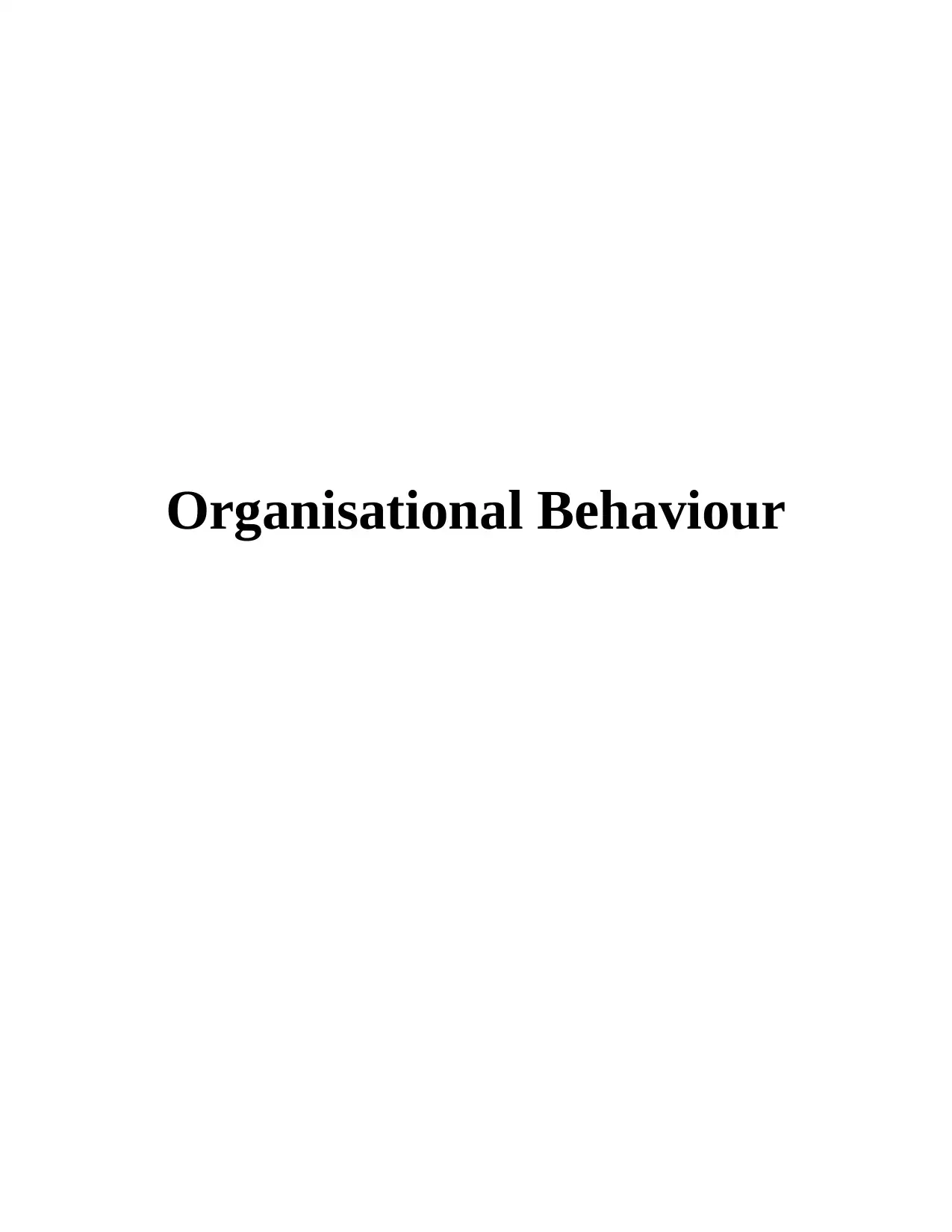
Organisational Behaviour
Paraphrase This Document
Need a fresh take? Get an instant paraphrase of this document with our AI Paraphraser
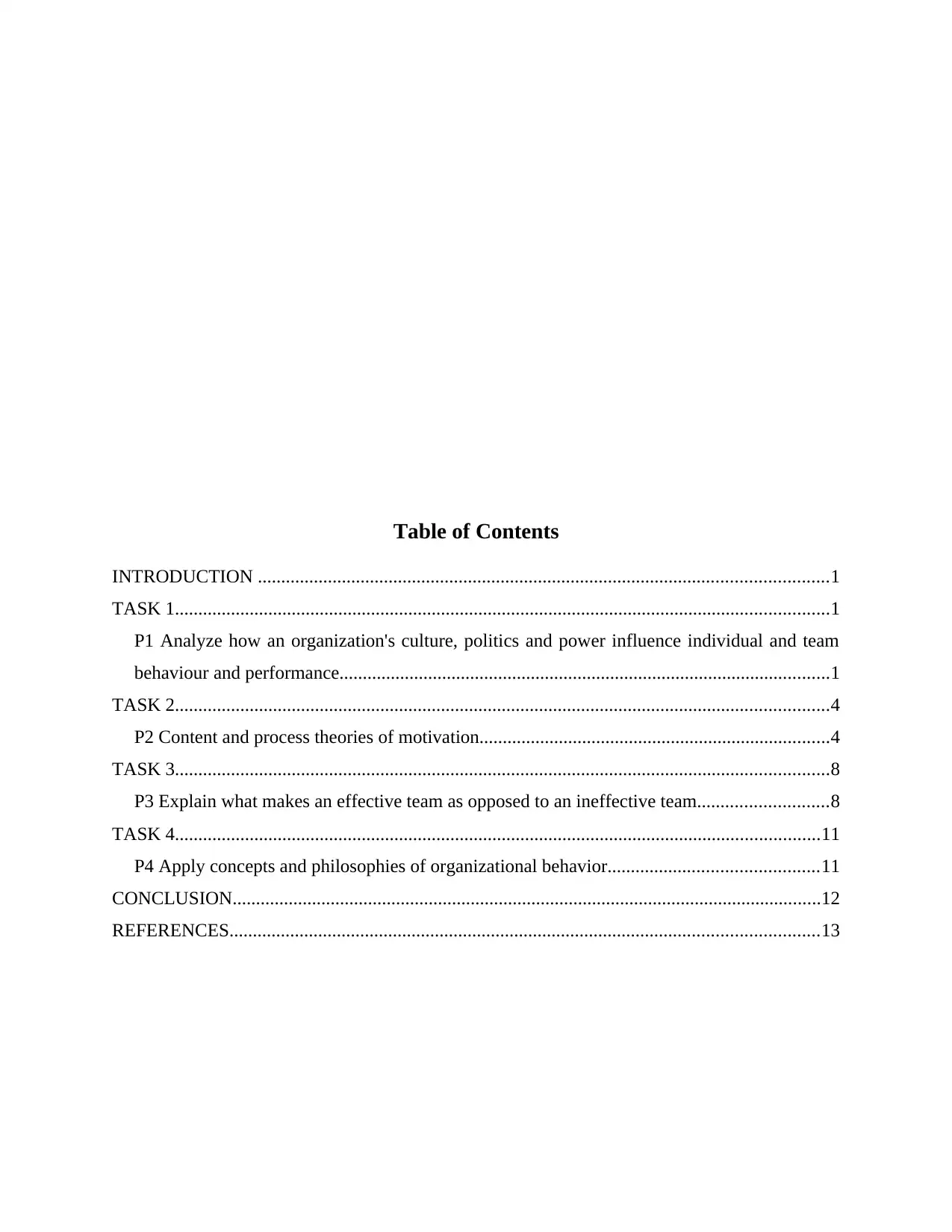
Table of Contents
INTRODUCTION ..........................................................................................................................1
TASK 1............................................................................................................................................1
P1 Analyze how an organization's culture, politics and power influence individual and team
behaviour and performance.........................................................................................................1
TASK 2............................................................................................................................................4
P2 Content and process theories of motivation...........................................................................4
TASK 3............................................................................................................................................8
P3 Explain what makes an effective team as opposed to an ineffective team............................8
TASK 4..........................................................................................................................................11
P4 Apply concepts and philosophies of organizational behavior.............................................11
CONCLUSION..............................................................................................................................12
REFERENCES..............................................................................................................................13
INTRODUCTION ..........................................................................................................................1
TASK 1............................................................................................................................................1
P1 Analyze how an organization's culture, politics and power influence individual and team
behaviour and performance.........................................................................................................1
TASK 2............................................................................................................................................4
P2 Content and process theories of motivation...........................................................................4
TASK 3............................................................................................................................................8
P3 Explain what makes an effective team as opposed to an ineffective team............................8
TASK 4..........................................................................................................................................11
P4 Apply concepts and philosophies of organizational behavior.............................................11
CONCLUSION..............................................................................................................................12
REFERENCES..............................................................................................................................13
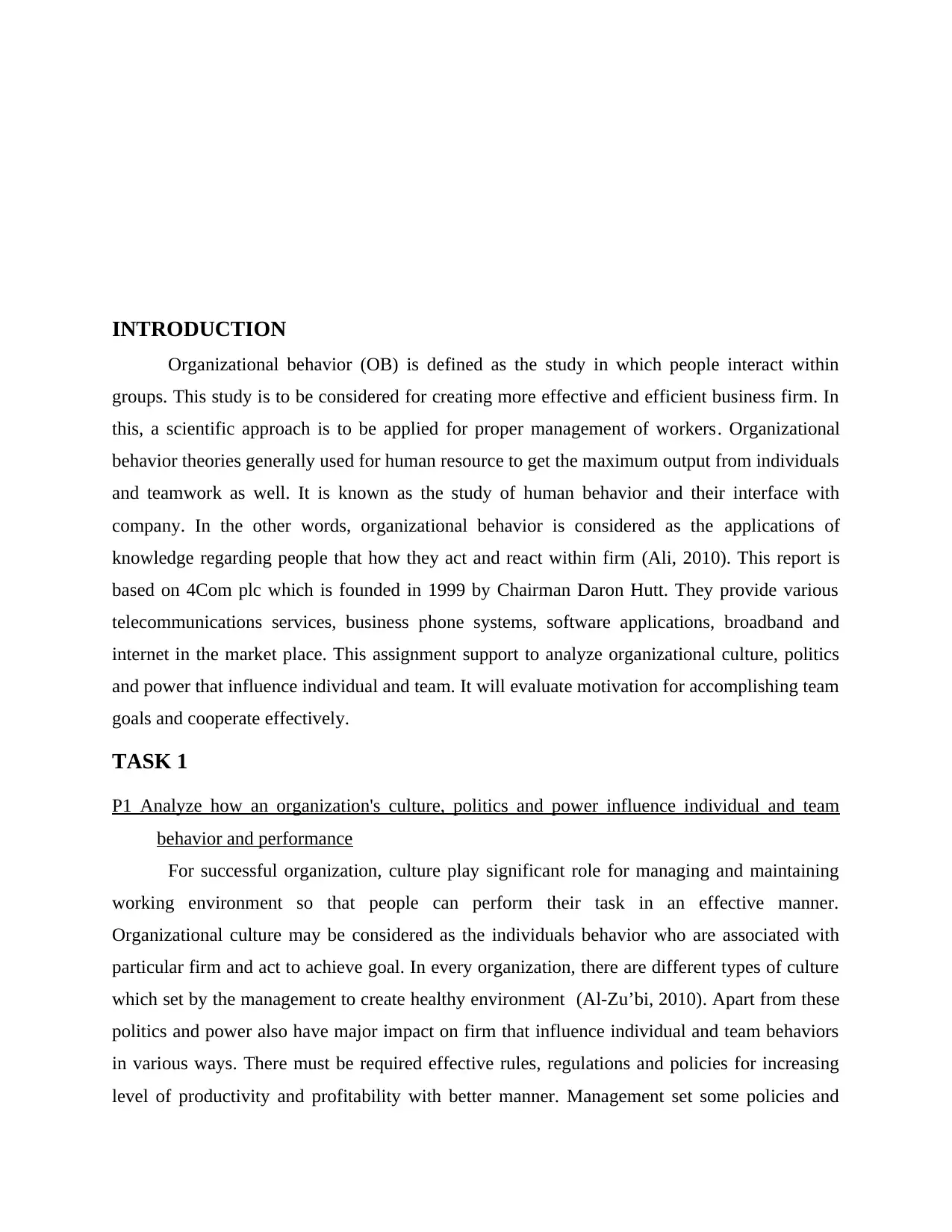
INTRODUCTION
Organizational behavior (OB) is defined as the study in which people interact within
groups. This study is to be considered for creating more effective and efficient business firm. In
this, a scientific approach is to be applied for proper management of workers. Organizational
behavior theories generally used for human resource to get the maximum output from individuals
and teamwork as well. It is known as the study of human behavior and their interface with
company. In the other words, organizational behavior is considered as the applications of
knowledge regarding people that how they act and react within firm (Ali, 2010). This report is
based on 4Com plc which is founded in 1999 by Chairman Daron Hutt. They provide various
telecommunications services, business phone systems, software applications, broadband and
internet in the market place. This assignment support to analyze organizational culture, politics
and power that influence individual and team. It will evaluate motivation for accomplishing team
goals and cooperate effectively.
TASK 1
P1 Analyze how an organization's culture, politics and power influence individual and team
behavior and performance
For successful organization, culture play significant role for managing and maintaining
working environment so that people can perform their task in an effective manner.
Organizational culture may be considered as the individuals behavior who are associated with
particular firm and act to achieve goal. In every organization, there are different types of culture
which set by the management to create healthy environment (Al-Zu’bi, 2010). Apart from these
politics and power also have major impact on firm that influence individual and team behaviors
in various ways. There must be required effective rules, regulations and policies for increasing
level of productivity and profitability with better manner. Management set some policies and
Organizational behavior (OB) is defined as the study in which people interact within
groups. This study is to be considered for creating more effective and efficient business firm. In
this, a scientific approach is to be applied for proper management of workers. Organizational
behavior theories generally used for human resource to get the maximum output from individuals
and teamwork as well. It is known as the study of human behavior and their interface with
company. In the other words, organizational behavior is considered as the applications of
knowledge regarding people that how they act and react within firm (Ali, 2010). This report is
based on 4Com plc which is founded in 1999 by Chairman Daron Hutt. They provide various
telecommunications services, business phone systems, software applications, broadband and
internet in the market place. This assignment support to analyze organizational culture, politics
and power that influence individual and team. It will evaluate motivation for accomplishing team
goals and cooperate effectively.
TASK 1
P1 Analyze how an organization's culture, politics and power influence individual and team
behavior and performance
For successful organization, culture play significant role for managing and maintaining
working environment so that people can perform their task in an effective manner.
Organizational culture may be considered as the individuals behavior who are associated with
particular firm and act to achieve goal. In every organization, there are different types of culture
which set by the management to create healthy environment (Al-Zu’bi, 2010). Apart from these
politics and power also have major impact on firm that influence individual and team behaviors
in various ways. There must be required effective rules, regulations and policies for increasing
level of productivity and profitability with better manner. Management set some policies and
⊘ This is a preview!⊘
Do you want full access?
Subscribe today to unlock all pages.

Trusted by 1+ million students worldwide
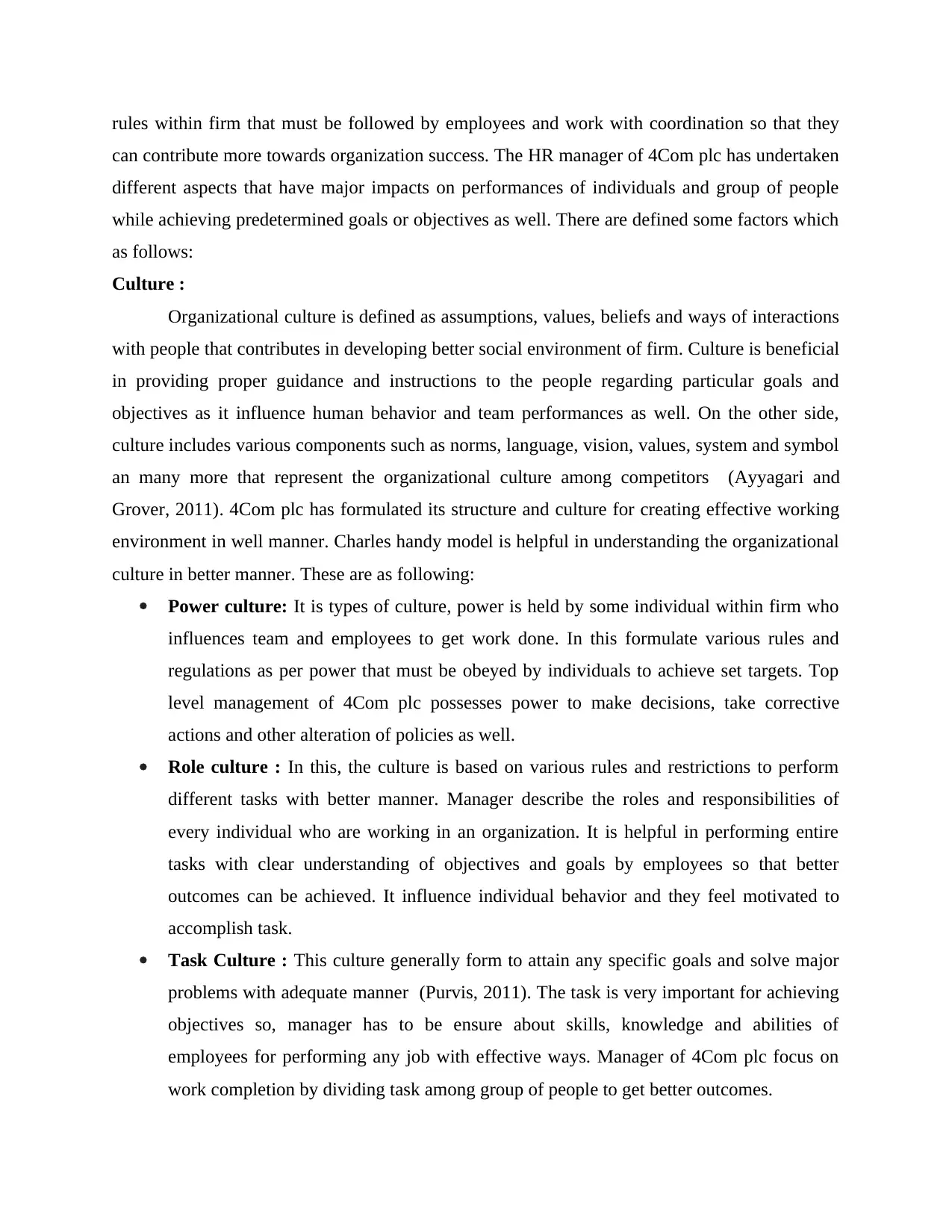
rules within firm that must be followed by employees and work with coordination so that they
can contribute more towards organization success. The HR manager of 4Com plc has undertaken
different aspects that have major impacts on performances of individuals and group of people
while achieving predetermined goals or objectives as well. There are defined some factors which
as follows:
Culture :
Organizational culture is defined as assumptions, values, beliefs and ways of interactions
with people that contributes in developing better social environment of firm. Culture is beneficial
in providing proper guidance and instructions to the people regarding particular goals and
objectives as it influence human behavior and team performances as well. On the other side,
culture includes various components such as norms, language, vision, values, system and symbol
an many more that represent the organizational culture among competitors (Ayyagari and
Grover, 2011). 4Com plc has formulated its structure and culture for creating effective working
environment in well manner. Charles handy model is helpful in understanding the organizational
culture in better manner. These are as following:
Power culture: It is types of culture, power is held by some individual within firm who
influences team and employees to get work done. In this formulate various rules and
regulations as per power that must be obeyed by individuals to achieve set targets. Top
level management of 4Com plc possesses power to make decisions, take corrective
actions and other alteration of policies as well.
Role culture : In this, the culture is based on various rules and restrictions to perform
different tasks with better manner. Manager describe the roles and responsibilities of
every individual who are working in an organization. It is helpful in performing entire
tasks with clear understanding of objectives and goals by employees so that better
outcomes can be achieved. It influence individual behavior and they feel motivated to
accomplish task.
Task Culture : This culture generally form to attain any specific goals and solve major
problems with adequate manner (Purvis, 2011). The task is very important for achieving
objectives so, manager has to be ensure about skills, knowledge and abilities of
employees for performing any job with effective ways. Manager of 4Com plc focus on
work completion by dividing task among group of people to get better outcomes.
can contribute more towards organization success. The HR manager of 4Com plc has undertaken
different aspects that have major impacts on performances of individuals and group of people
while achieving predetermined goals or objectives as well. There are defined some factors which
as follows:
Culture :
Organizational culture is defined as assumptions, values, beliefs and ways of interactions
with people that contributes in developing better social environment of firm. Culture is beneficial
in providing proper guidance and instructions to the people regarding particular goals and
objectives as it influence human behavior and team performances as well. On the other side,
culture includes various components such as norms, language, vision, values, system and symbol
an many more that represent the organizational culture among competitors (Ayyagari and
Grover, 2011). 4Com plc has formulated its structure and culture for creating effective working
environment in well manner. Charles handy model is helpful in understanding the organizational
culture in better manner. These are as following:
Power culture: It is types of culture, power is held by some individual within firm who
influences team and employees to get work done. In this formulate various rules and
regulations as per power that must be obeyed by individuals to achieve set targets. Top
level management of 4Com plc possesses power to make decisions, take corrective
actions and other alteration of policies as well.
Role culture : In this, the culture is based on various rules and restrictions to perform
different tasks with better manner. Manager describe the roles and responsibilities of
every individual who are working in an organization. It is helpful in performing entire
tasks with clear understanding of objectives and goals by employees so that better
outcomes can be achieved. It influence individual behavior and they feel motivated to
accomplish task.
Task Culture : This culture generally form to attain any specific goals and solve major
problems with adequate manner (Purvis, 2011). The task is very important for achieving
objectives so, manager has to be ensure about skills, knowledge and abilities of
employees for performing any job with effective ways. Manager of 4Com plc focus on
work completion by dividing task among group of people to get better outcomes.
Paraphrase This Document
Need a fresh take? Get an instant paraphrase of this document with our AI Paraphraser
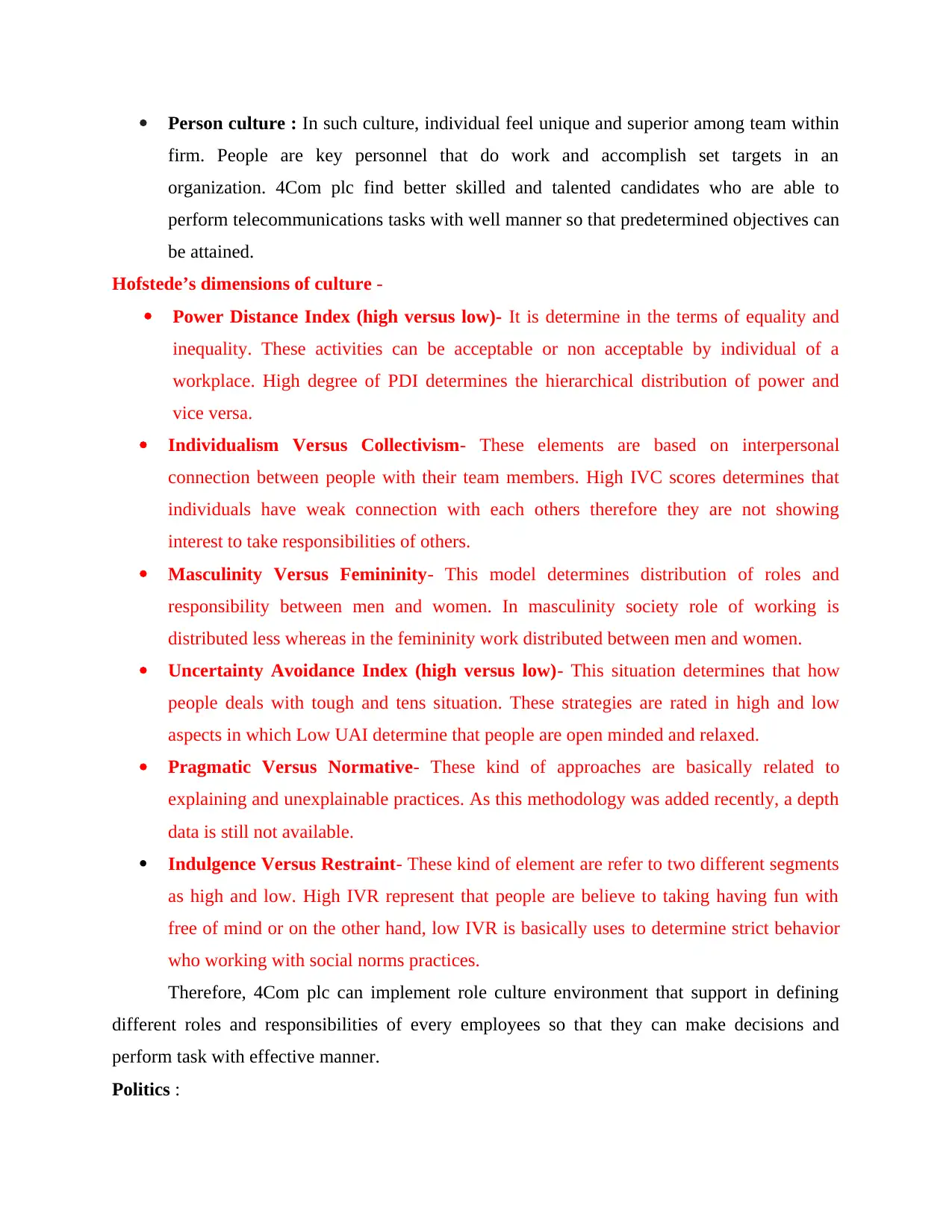
Person culture : In such culture, individual feel unique and superior among team within
firm. People are key personnel that do work and accomplish set targets in an
organization. 4Com plc find better skilled and talented candidates who are able to
perform telecommunications tasks with well manner so that predetermined objectives can
be attained.
Hofstede’s dimensions of culture -
Power Distance Index (high versus low)- It is determine in the terms of equality and
inequality. These activities can be acceptable or non acceptable by individual of a
workplace. High degree of PDI determines the hierarchical distribution of power and
vice versa.
Individualism Versus Collectivism- These elements are based on interpersonal
connection between people with their team members. High IVC scores determines that
individuals have weak connection with each others therefore they are not showing
interest to take responsibilities of others.
Masculinity Versus Femininity- This model determines distribution of roles and
responsibility between men and women. In masculinity society role of working is
distributed less whereas in the femininity work distributed between men and women.
Uncertainty Avoidance Index (high versus low)- This situation determines that how
people deals with tough and tens situation. These strategies are rated in high and low
aspects in which Low UAI determine that people are open minded and relaxed.
Pragmatic Versus Normative- These kind of approaches are basically related to
explaining and unexplainable practices. As this methodology was added recently, a depth
data is still not available.
Indulgence Versus Restraint- These kind of element are refer to two different segments
as high and low. High IVR represent that people are believe to taking having fun with
free of mind or on the other hand, low IVR is basically uses to determine strict behavior
who working with social norms practices.
Therefore, 4Com plc can implement role culture environment that support in defining
different roles and responsibilities of every employees so that they can make decisions and
perform task with effective manner.
Politics :
firm. People are key personnel that do work and accomplish set targets in an
organization. 4Com plc find better skilled and talented candidates who are able to
perform telecommunications tasks with well manner so that predetermined objectives can
be attained.
Hofstede’s dimensions of culture -
Power Distance Index (high versus low)- It is determine in the terms of equality and
inequality. These activities can be acceptable or non acceptable by individual of a
workplace. High degree of PDI determines the hierarchical distribution of power and
vice versa.
Individualism Versus Collectivism- These elements are based on interpersonal
connection between people with their team members. High IVC scores determines that
individuals have weak connection with each others therefore they are not showing
interest to take responsibilities of others.
Masculinity Versus Femininity- This model determines distribution of roles and
responsibility between men and women. In masculinity society role of working is
distributed less whereas in the femininity work distributed between men and women.
Uncertainty Avoidance Index (high versus low)- This situation determines that how
people deals with tough and tens situation. These strategies are rated in high and low
aspects in which Low UAI determine that people are open minded and relaxed.
Pragmatic Versus Normative- These kind of approaches are basically related to
explaining and unexplainable practices. As this methodology was added recently, a depth
data is still not available.
Indulgence Versus Restraint- These kind of element are refer to two different segments
as high and low. High IVR represent that people are believe to taking having fun with
free of mind or on the other hand, low IVR is basically uses to determine strict behavior
who working with social norms practices.
Therefore, 4Com plc can implement role culture environment that support in defining
different roles and responsibilities of every employees so that they can make decisions and
perform task with effective manner.
Politics :
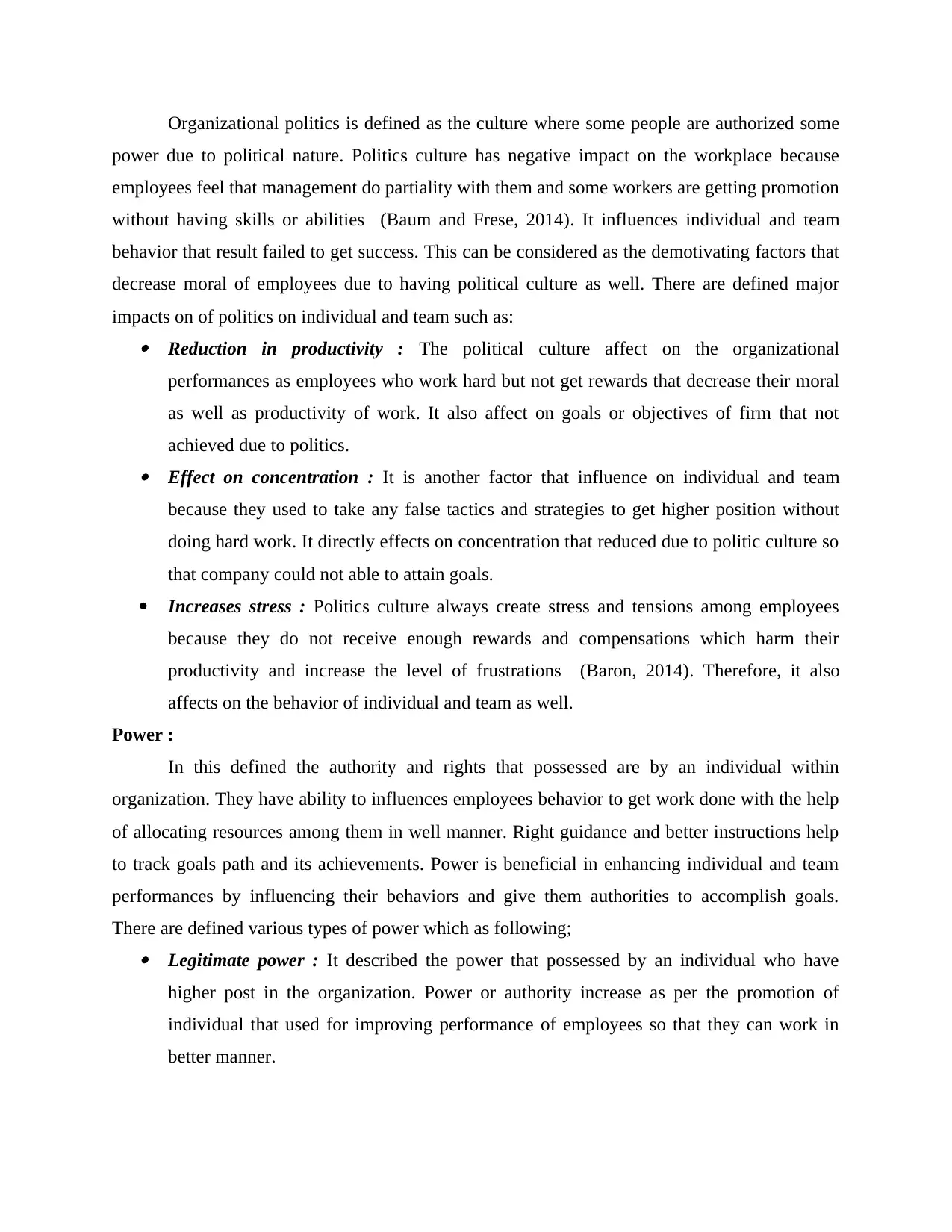
Organizational politics is defined as the culture where some people are authorized some
power due to political nature. Politics culture has negative impact on the workplace because
employees feel that management do partiality with them and some workers are getting promotion
without having skills or abilities (Baum and Frese, 2014). It influences individual and team
behavior that result failed to get success. This can be considered as the demotivating factors that
decrease moral of employees due to having political culture as well. There are defined major
impacts on of politics on individual and team such as: Reduction in productivity : The political culture affect on the organizational
performances as employees who work hard but not get rewards that decrease their moral
as well as productivity of work. It also affect on goals or objectives of firm that not
achieved due to politics. Effect on concentration : It is another factor that influence on individual and team
because they used to take any false tactics and strategies to get higher position without
doing hard work. It directly effects on concentration that reduced due to politic culture so
that company could not able to attain goals.
Increases stress : Politics culture always create stress and tensions among employees
because they do not receive enough rewards and compensations which harm their
productivity and increase the level of frustrations (Baron, 2014). Therefore, it also
affects on the behavior of individual and team as well.
Power :
In this defined the authority and rights that possessed are by an individual within
organization. They have ability to influences employees behavior to get work done with the help
of allocating resources among them in well manner. Right guidance and better instructions help
to track goals path and its achievements. Power is beneficial in enhancing individual and team
performances by influencing their behaviors and give them authorities to accomplish goals.
There are defined various types of power which as following; Legitimate power : It described the power that possessed by an individual who have
higher post in the organization. Power or authority increase as per the promotion of
individual that used for improving performance of employees so that they can work in
better manner.
power due to political nature. Politics culture has negative impact on the workplace because
employees feel that management do partiality with them and some workers are getting promotion
without having skills or abilities (Baum and Frese, 2014). It influences individual and team
behavior that result failed to get success. This can be considered as the demotivating factors that
decrease moral of employees due to having political culture as well. There are defined major
impacts on of politics on individual and team such as: Reduction in productivity : The political culture affect on the organizational
performances as employees who work hard but not get rewards that decrease their moral
as well as productivity of work. It also affect on goals or objectives of firm that not
achieved due to politics. Effect on concentration : It is another factor that influence on individual and team
because they used to take any false tactics and strategies to get higher position without
doing hard work. It directly effects on concentration that reduced due to politic culture so
that company could not able to attain goals.
Increases stress : Politics culture always create stress and tensions among employees
because they do not receive enough rewards and compensations which harm their
productivity and increase the level of frustrations (Baron, 2014). Therefore, it also
affects on the behavior of individual and team as well.
Power :
In this defined the authority and rights that possessed are by an individual within
organization. They have ability to influences employees behavior to get work done with the help
of allocating resources among them in well manner. Right guidance and better instructions help
to track goals path and its achievements. Power is beneficial in enhancing individual and team
performances by influencing their behaviors and give them authorities to accomplish goals.
There are defined various types of power which as following; Legitimate power : It described the power that possessed by an individual who have
higher post in the organization. Power or authority increase as per the promotion of
individual that used for improving performance of employees so that they can work in
better manner.
⊘ This is a preview!⊘
Do you want full access?
Subscribe today to unlock all pages.

Trusted by 1+ million students worldwide
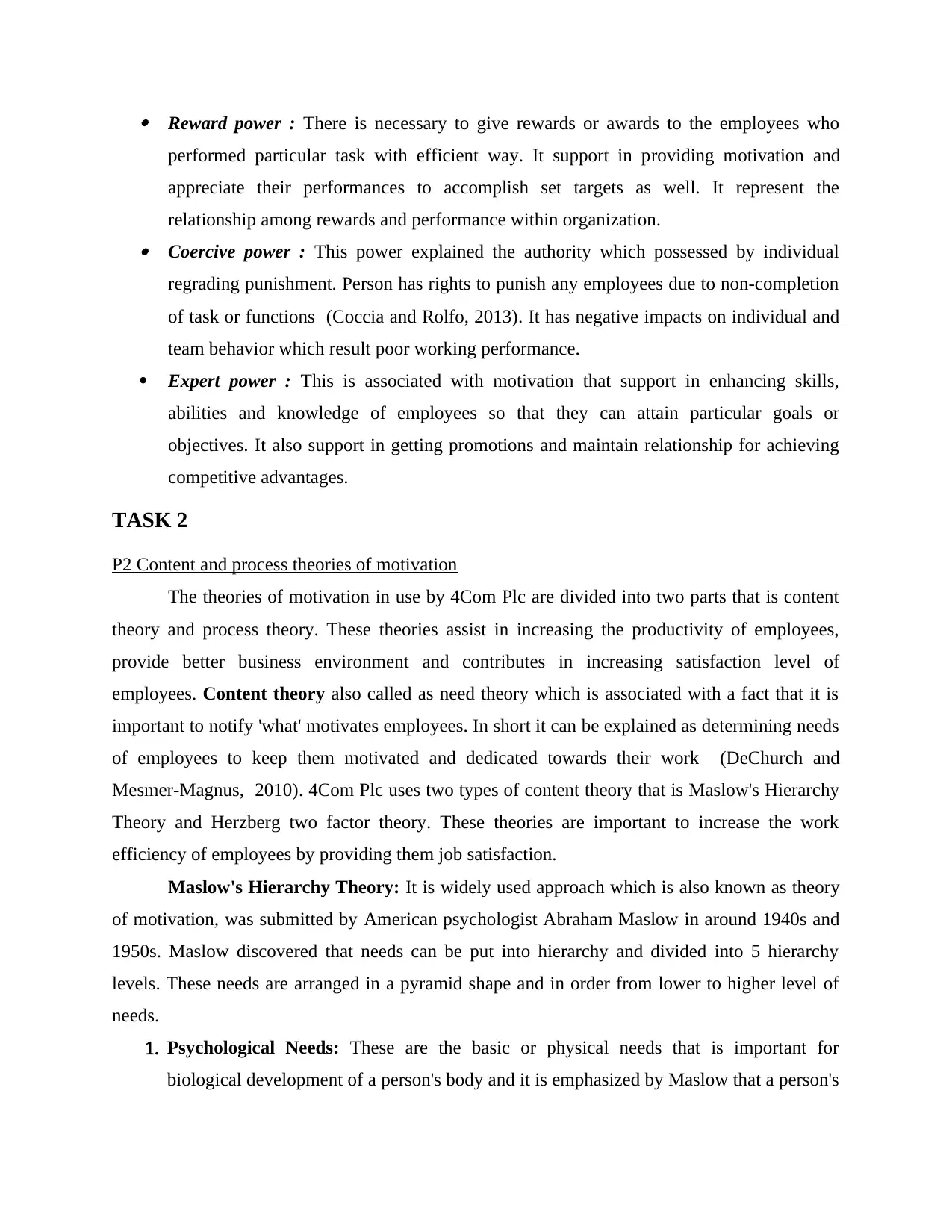
Reward power : There is necessary to give rewards or awards to the employees who
performed particular task with efficient way. It support in providing motivation and
appreciate their performances to accomplish set targets as well. It represent the
relationship among rewards and performance within organization. Coercive power : This power explained the authority which possessed by individual
regrading punishment. Person has rights to punish any employees due to non-completion
of task or functions (Coccia and Rolfo, 2013). It has negative impacts on individual and
team behavior which result poor working performance.
Expert power : This is associated with motivation that support in enhancing skills,
abilities and knowledge of employees so that they can attain particular goals or
objectives. It also support in getting promotions and maintain relationship for achieving
competitive advantages.
TASK 2
P2 Content and process theories of motivation
The theories of motivation in use by 4Com Plc are divided into two parts that is content
theory and process theory. These theories assist in increasing the productivity of employees,
provide better business environment and contributes in increasing satisfaction level of
employees. Content theory also called as need theory which is associated with a fact that it is
important to notify 'what' motivates employees. In short it can be explained as determining needs
of employees to keep them motivated and dedicated towards their work (DeChurch and
Mesmer-Magnus, 2010). 4Com Plc uses two types of content theory that is Maslow's Hierarchy
Theory and Herzberg two factor theory. These theories are important to increase the work
efficiency of employees by providing them job satisfaction.
Maslow's Hierarchy Theory: It is widely used approach which is also known as theory
of motivation, was submitted by American psychologist Abraham Maslow in around 1940s and
1950s. Maslow discovered that needs can be put into hierarchy and divided into 5 hierarchy
levels. These needs are arranged in a pyramid shape and in order from lower to higher level of
needs.
1. Psychological Needs: These are the basic or physical needs that is important for
biological development of a person's body and it is emphasized by Maslow that a person's
performed particular task with efficient way. It support in providing motivation and
appreciate their performances to accomplish set targets as well. It represent the
relationship among rewards and performance within organization. Coercive power : This power explained the authority which possessed by individual
regrading punishment. Person has rights to punish any employees due to non-completion
of task or functions (Coccia and Rolfo, 2013). It has negative impacts on individual and
team behavior which result poor working performance.
Expert power : This is associated with motivation that support in enhancing skills,
abilities and knowledge of employees so that they can attain particular goals or
objectives. It also support in getting promotions and maintain relationship for achieving
competitive advantages.
TASK 2
P2 Content and process theories of motivation
The theories of motivation in use by 4Com Plc are divided into two parts that is content
theory and process theory. These theories assist in increasing the productivity of employees,
provide better business environment and contributes in increasing satisfaction level of
employees. Content theory also called as need theory which is associated with a fact that it is
important to notify 'what' motivates employees. In short it can be explained as determining needs
of employees to keep them motivated and dedicated towards their work (DeChurch and
Mesmer-Magnus, 2010). 4Com Plc uses two types of content theory that is Maslow's Hierarchy
Theory and Herzberg two factor theory. These theories are important to increase the work
efficiency of employees by providing them job satisfaction.
Maslow's Hierarchy Theory: It is widely used approach which is also known as theory
of motivation, was submitted by American psychologist Abraham Maslow in around 1940s and
1950s. Maslow discovered that needs can be put into hierarchy and divided into 5 hierarchy
levels. These needs are arranged in a pyramid shape and in order from lower to higher level of
needs.
1. Psychological Needs: These are the basic or physical needs that is important for
biological development of a person's body and it is emphasized by Maslow that a person's
Paraphrase This Document
Need a fresh take? Get an instant paraphrase of this document with our AI Paraphraser
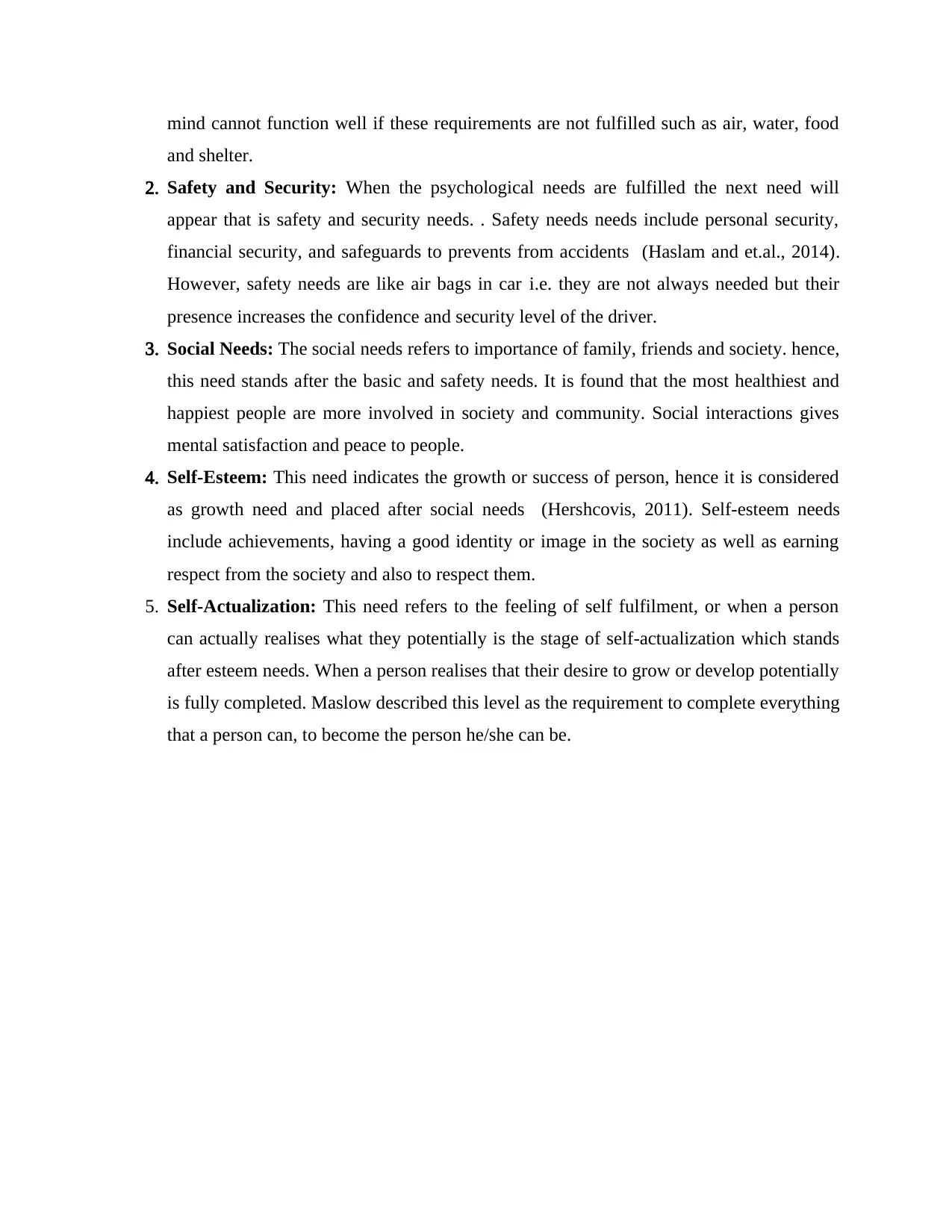
mind cannot function well if these requirements are not fulfilled such as air, water, food
and shelter.
2. Safety and Security: When the psychological needs are fulfilled the next need will
appear that is safety and security needs. . Safety needs needs include personal security,
financial security, and safeguards to prevents from accidents (Haslam and et.al., 2014).
However, safety needs are like air bags in car i.e. they are not always needed but their
presence increases the confidence and security level of the driver.
3. Social Needs: The social needs refers to importance of family, friends and society. hence,
this need stands after the basic and safety needs. It is found that the most healthiest and
happiest people are more involved in society and community. Social interactions gives
mental satisfaction and peace to people.
4. Self-Esteem: This need indicates the growth or success of person, hence it is considered
as growth need and placed after social needs (Hershcovis, 2011). Self-esteem needs
include achievements, having a good identity or image in the society as well as earning
respect from the society and also to respect them.
5. Self-Actualization: This need refers to the feeling of self fulfilment, or when a person
can actually realises what they potentially is the stage of self-actualization which stands
after esteem needs. When a person realises that their desire to grow or develop potentially
is fully completed. Maslow described this level as the requirement to complete everything
that a person can, to become the person he/she can be.
and shelter.
2. Safety and Security: When the psychological needs are fulfilled the next need will
appear that is safety and security needs. . Safety needs needs include personal security,
financial security, and safeguards to prevents from accidents (Haslam and et.al., 2014).
However, safety needs are like air bags in car i.e. they are not always needed but their
presence increases the confidence and security level of the driver.
3. Social Needs: The social needs refers to importance of family, friends and society. hence,
this need stands after the basic and safety needs. It is found that the most healthiest and
happiest people are more involved in society and community. Social interactions gives
mental satisfaction and peace to people.
4. Self-Esteem: This need indicates the growth or success of person, hence it is considered
as growth need and placed after social needs (Hershcovis, 2011). Self-esteem needs
include achievements, having a good identity or image in the society as well as earning
respect from the society and also to respect them.
5. Self-Actualization: This need refers to the feeling of self fulfilment, or when a person
can actually realises what they potentially is the stage of self-actualization which stands
after esteem needs. When a person realises that their desire to grow or develop potentially
is fully completed. Maslow described this level as the requirement to complete everything
that a person can, to become the person he/she can be.
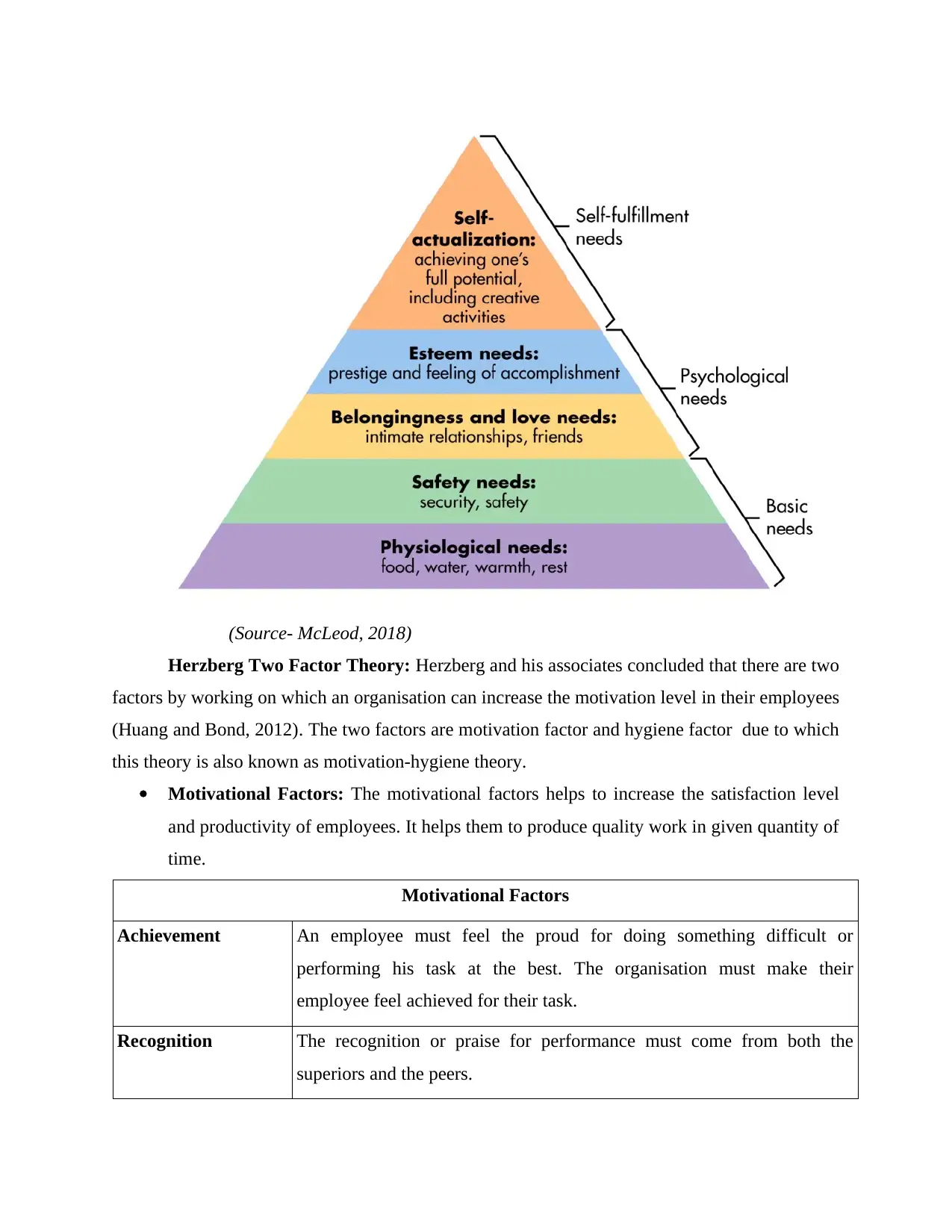
(Source- McLeod, 2018)
Herzberg Two Factor Theory: Herzberg and his associates concluded that there are two
factors by working on which an organisation can increase the motivation level in their employees
(Huang and Bond, 2012). The two factors are motivation factor and hygiene factor due to which
this theory is also known as motivation-hygiene theory.
Motivational Factors: The motivational factors helps to increase the satisfaction level
and productivity of employees. It helps them to produce quality work in given quantity of
time.
Motivational Factors
Achievement An employee must feel the proud for doing something difficult or
performing his task at the best. The organisation must make their
employee feel achieved for their task.
Recognition The recognition or praise for performance must come from both the
superiors and the peers.
Illustration 1: Maslow's Hierarchy of Needs
Herzberg Two Factor Theory: Herzberg and his associates concluded that there are two
factors by working on which an organisation can increase the motivation level in their employees
(Huang and Bond, 2012). The two factors are motivation factor and hygiene factor due to which
this theory is also known as motivation-hygiene theory.
Motivational Factors: The motivational factors helps to increase the satisfaction level
and productivity of employees. It helps them to produce quality work in given quantity of
time.
Motivational Factors
Achievement An employee must feel the proud for doing something difficult or
performing his task at the best. The organisation must make their
employee feel achieved for their task.
Recognition The recognition or praise for performance must come from both the
superiors and the peers.
Illustration 1: Maslow's Hierarchy of Needs
⊘ This is a preview!⊘
Do you want full access?
Subscribe today to unlock all pages.

Trusted by 1+ million students worldwide
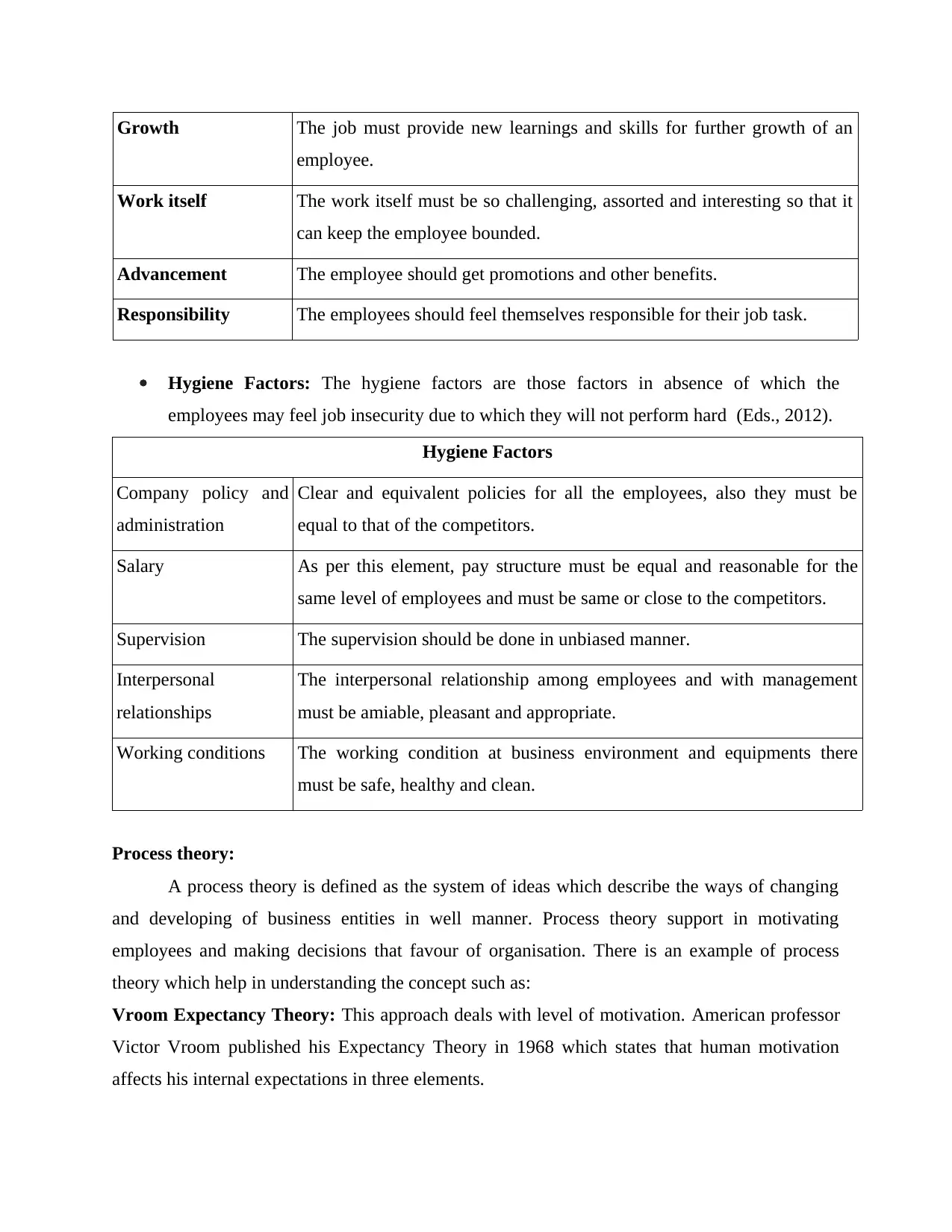
Growth The job must provide new learnings and skills for further growth of an
employee.
Work itself The work itself must be so challenging, assorted and interesting so that it
can keep the employee bounded.
Advancement The employee should get promotions and other benefits.
Responsibility The employees should feel themselves responsible for their job task.
Hygiene Factors: The hygiene factors are those factors in absence of which the
employees may feel job insecurity due to which they will not perform hard (Eds., 2012).
Hygiene Factors
Company policy and
administration
Clear and equivalent policies for all the employees, also they must be
equal to that of the competitors.
Salary As per this element, pay structure must be equal and reasonable for the
same level of employees and must be same or close to the competitors.
Supervision The supervision should be done in unbiased manner.
Interpersonal
relationships
The interpersonal relationship among employees and with management
must be amiable, pleasant and appropriate.
Working conditions The working condition at business environment and equipments there
must be safe, healthy and clean.
Process theory:
A process theory is defined as the system of ideas which describe the ways of changing
and developing of business entities in well manner. Process theory support in motivating
employees and making decisions that favour of organisation. There is an example of process
theory which help in understanding the concept such as:
Vroom Expectancy Theory: This approach deals with level of motivation. American professor
Victor Vroom published his Expectancy Theory in 1968 which states that human motivation
affects his internal expectations in three elements.
employee.
Work itself The work itself must be so challenging, assorted and interesting so that it
can keep the employee bounded.
Advancement The employee should get promotions and other benefits.
Responsibility The employees should feel themselves responsible for their job task.
Hygiene Factors: The hygiene factors are those factors in absence of which the
employees may feel job insecurity due to which they will not perform hard (Eds., 2012).
Hygiene Factors
Company policy and
administration
Clear and equivalent policies for all the employees, also they must be
equal to that of the competitors.
Salary As per this element, pay structure must be equal and reasonable for the
same level of employees and must be same or close to the competitors.
Supervision The supervision should be done in unbiased manner.
Interpersonal
relationships
The interpersonal relationship among employees and with management
must be amiable, pleasant and appropriate.
Working conditions The working condition at business environment and equipments there
must be safe, healthy and clean.
Process theory:
A process theory is defined as the system of ideas which describe the ways of changing
and developing of business entities in well manner. Process theory support in motivating
employees and making decisions that favour of organisation. There is an example of process
theory which help in understanding the concept such as:
Vroom Expectancy Theory: This approach deals with level of motivation. American professor
Victor Vroom published his Expectancy Theory in 1968 which states that human motivation
affects his internal expectations in three elements.
Paraphrase This Document
Need a fresh take? Get an instant paraphrase of this document with our AI Paraphraser
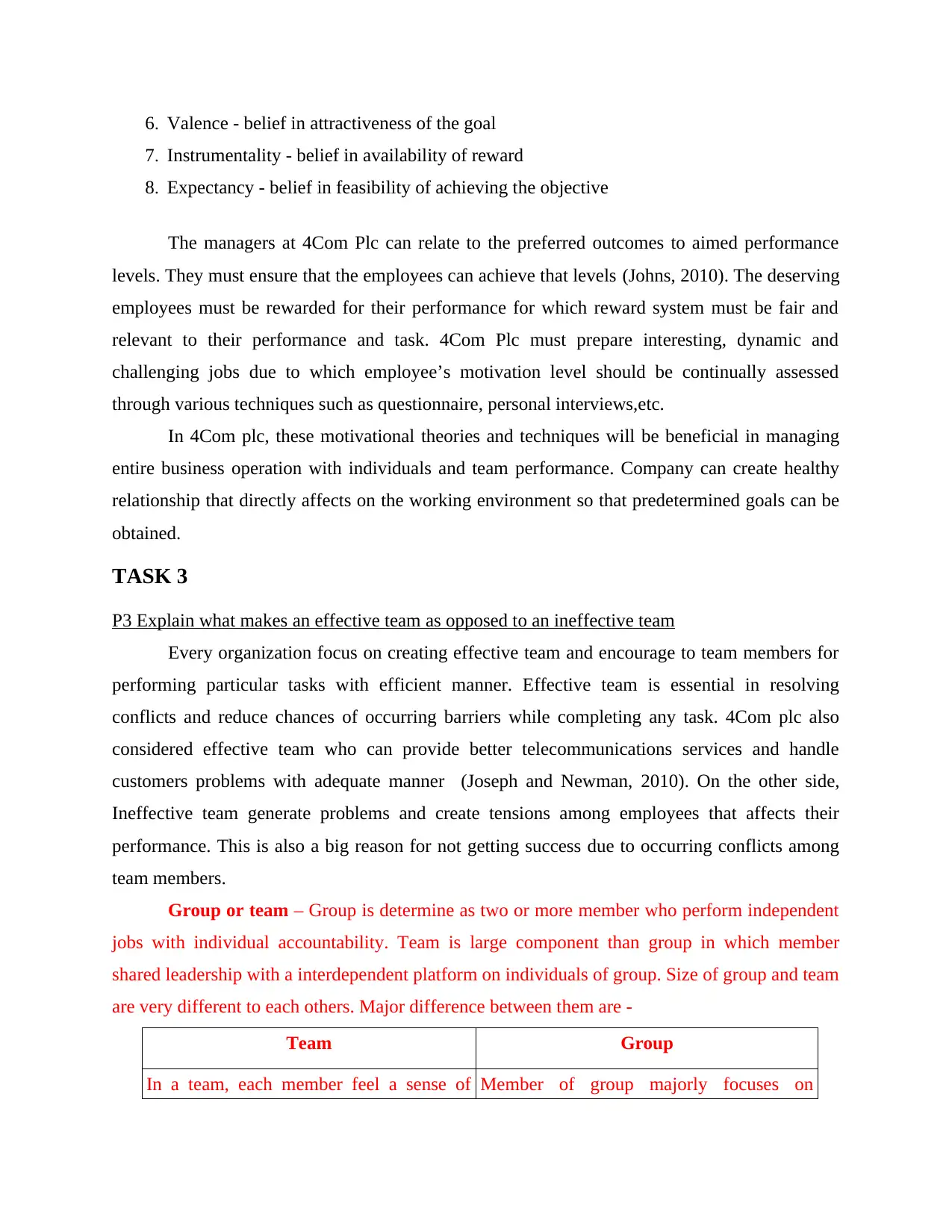
6. Valence - belief in attractiveness of the goal
7. Instrumentality - belief in availability of reward
8. Expectancy - belief in feasibility of achieving the objective
The managers at 4Com Plc can relate to the preferred outcomes to aimed performance
levels. They must ensure that the employees can achieve that levels (Johns, 2010). The deserving
employees must be rewarded for their performance for which reward system must be fair and
relevant to their performance and task. 4Com Plc must prepare interesting, dynamic and
challenging jobs due to which employee’s motivation level should be continually assessed
through various techniques such as questionnaire, personal interviews,etc.
In 4Com plc, these motivational theories and techniques will be beneficial in managing
entire business operation with individuals and team performance. Company can create healthy
relationship that directly affects on the working environment so that predetermined goals can be
obtained.
TASK 3
P3 Explain what makes an effective team as opposed to an ineffective team
Every organization focus on creating effective team and encourage to team members for
performing particular tasks with efficient manner. Effective team is essential in resolving
conflicts and reduce chances of occurring barriers while completing any task. 4Com plc also
considered effective team who can provide better telecommunications services and handle
customers problems with adequate manner (Joseph and Newman, 2010). On the other side,
Ineffective team generate problems and create tensions among employees that affects their
performance. This is also a big reason for not getting success due to occurring conflicts among
team members.
Group or team – Group is determine as two or more member who perform independent
jobs with individual accountability. Team is large component than group in which member
shared leadership with a interdependent platform on individuals of group. Size of group and team
are very different to each others. Major difference between them are -
Team Group
In a team, each member feel a sense of Member of group majorly focuses on
7. Instrumentality - belief in availability of reward
8. Expectancy - belief in feasibility of achieving the objective
The managers at 4Com Plc can relate to the preferred outcomes to aimed performance
levels. They must ensure that the employees can achieve that levels (Johns, 2010). The deserving
employees must be rewarded for their performance for which reward system must be fair and
relevant to their performance and task. 4Com Plc must prepare interesting, dynamic and
challenging jobs due to which employee’s motivation level should be continually assessed
through various techniques such as questionnaire, personal interviews,etc.
In 4Com plc, these motivational theories and techniques will be beneficial in managing
entire business operation with individuals and team performance. Company can create healthy
relationship that directly affects on the working environment so that predetermined goals can be
obtained.
TASK 3
P3 Explain what makes an effective team as opposed to an ineffective team
Every organization focus on creating effective team and encourage to team members for
performing particular tasks with efficient manner. Effective team is essential in resolving
conflicts and reduce chances of occurring barriers while completing any task. 4Com plc also
considered effective team who can provide better telecommunications services and handle
customers problems with adequate manner (Joseph and Newman, 2010). On the other side,
Ineffective team generate problems and create tensions among employees that affects their
performance. This is also a big reason for not getting success due to occurring conflicts among
team members.
Group or team – Group is determine as two or more member who perform independent
jobs with individual accountability. Team is large component than group in which member
shared leadership with a interdependent platform on individuals of group. Size of group and team
are very different to each others. Major difference between them are -
Team Group
In a team, each member feel a sense of Member of group majorly focuses on
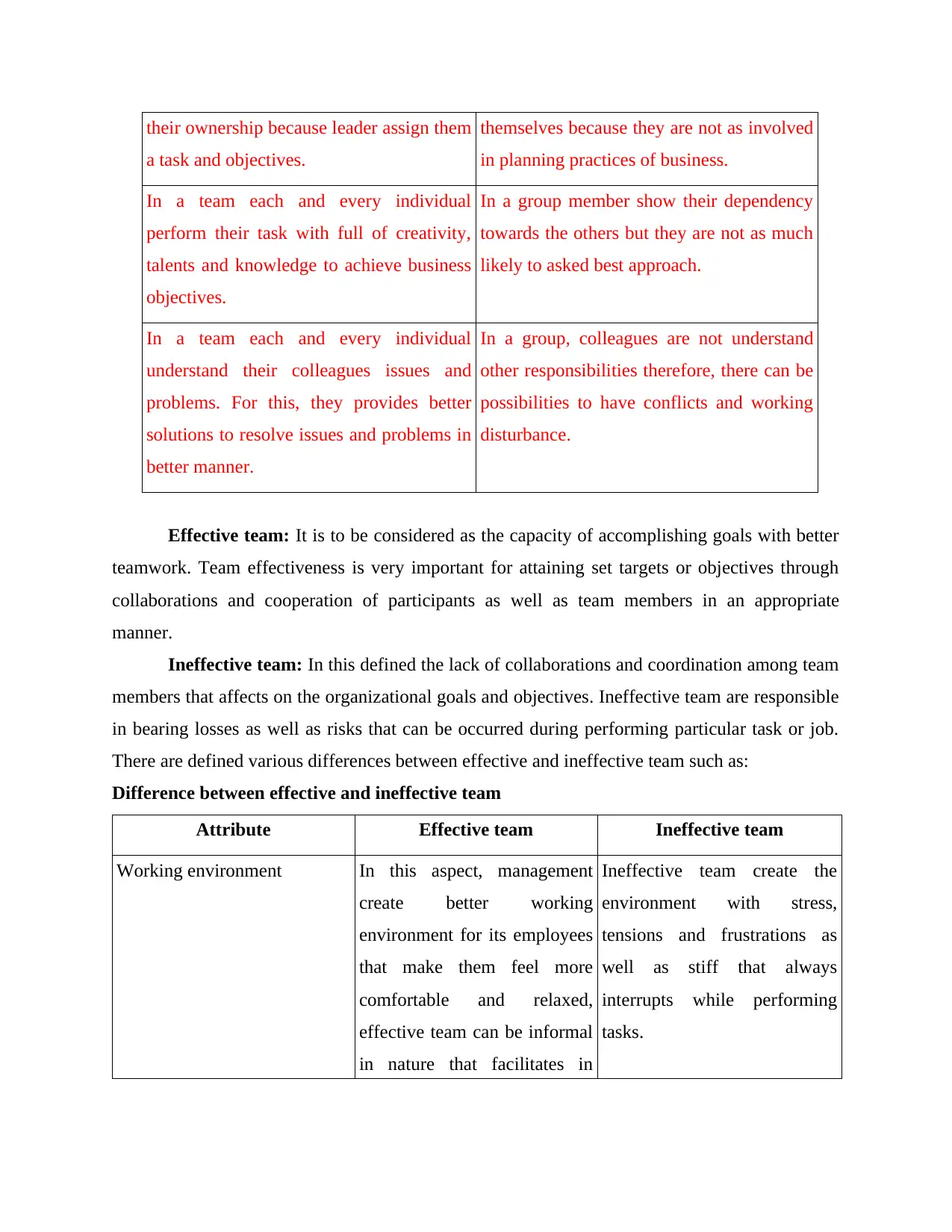
their ownership because leader assign them
a task and objectives.
themselves because they are not as involved
in planning practices of business.
In a team each and every individual
perform their task with full of creativity,
talents and knowledge to achieve business
objectives.
In a group member show their dependency
towards the others but they are not as much
likely to asked best approach.
In a team each and every individual
understand their colleagues issues and
problems. For this, they provides better
solutions to resolve issues and problems in
better manner.
In a group, colleagues are not understand
other responsibilities therefore, there can be
possibilities to have conflicts and working
disturbance.
Effective team: It is to be considered as the capacity of accomplishing goals with better
teamwork. Team effectiveness is very important for attaining set targets or objectives through
collaborations and cooperation of participants as well as team members in an appropriate
manner.
Ineffective team: In this defined the lack of collaborations and coordination among team
members that affects on the organizational goals and objectives. Ineffective team are responsible
in bearing losses as well as risks that can be occurred during performing particular task or job.
There are defined various differences between effective and ineffective team such as:
Difference between effective and ineffective team
Attribute Effective team Ineffective team
Working environment In this aspect, management
create better working
environment for its employees
that make them feel more
comfortable and relaxed,
effective team can be informal
in nature that facilitates in
Ineffective team create the
environment with stress,
tensions and frustrations as
well as stiff that always
interrupts while performing
tasks.
a task and objectives.
themselves because they are not as involved
in planning practices of business.
In a team each and every individual
perform their task with full of creativity,
talents and knowledge to achieve business
objectives.
In a group member show their dependency
towards the others but they are not as much
likely to asked best approach.
In a team each and every individual
understand their colleagues issues and
problems. For this, they provides better
solutions to resolve issues and problems in
better manner.
In a group, colleagues are not understand
other responsibilities therefore, there can be
possibilities to have conflicts and working
disturbance.
Effective team: It is to be considered as the capacity of accomplishing goals with better
teamwork. Team effectiveness is very important for attaining set targets or objectives through
collaborations and cooperation of participants as well as team members in an appropriate
manner.
Ineffective team: In this defined the lack of collaborations and coordination among team
members that affects on the organizational goals and objectives. Ineffective team are responsible
in bearing losses as well as risks that can be occurred during performing particular task or job.
There are defined various differences between effective and ineffective team such as:
Difference between effective and ineffective team
Attribute Effective team Ineffective team
Working environment In this aspect, management
create better working
environment for its employees
that make them feel more
comfortable and relaxed,
effective team can be informal
in nature that facilitates in
Ineffective team create the
environment with stress,
tensions and frustrations as
well as stiff that always
interrupts while performing
tasks.
⊘ This is a preview!⊘
Do you want full access?
Subscribe today to unlock all pages.

Trusted by 1+ million students worldwide
1 out of 19
Related Documents
Your All-in-One AI-Powered Toolkit for Academic Success.
+13062052269
info@desklib.com
Available 24*7 on WhatsApp / Email
![[object Object]](/_next/static/media/star-bottom.7253800d.svg)
Unlock your academic potential
Copyright © 2020–2026 A2Z Services. All Rights Reserved. Developed and managed by ZUCOL.





